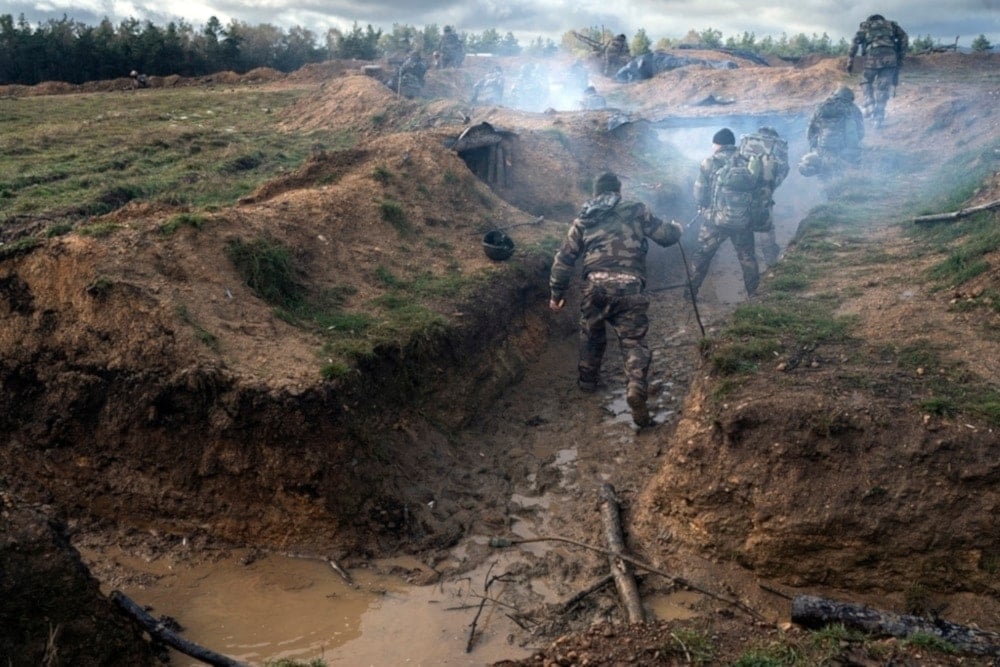Western Europe’s support for Ukraine diminishes amid ongoing war: Poll
A YouGov survey finds that in four out of seven countries, a negotiated resolution to the Ukrainian crisis is the preferred option.
-

Ukrainian infantrymen train with French soldiers to learn combat skills in France, on Tuesday, November 7, 2023. (AP)
Public support for backing Ukraine “until it wins” has significantly declined across Western Europe, according to a recent survey, as questions arise about the future of US military aid to Kiev under Donald Trump’s anticipated return to the White House, The Guardian reported.
A December YouGov poll conducted in France, Germany, Italy, Spain, Sweden, Denmark, and the UK revealed a notable drop over the past year in the willingness to support Ukraine to victory, even if it meant prolonging the conflict.
Conversely, the survey showed growing support for a negotiated resolution to the war, even if it resulted in Russia retaining control of parts of Ukraine. This approach was favored in four out of the seven countries surveyed.
While there was some discomfort with the idea of a settlement requiring Ukraine to cede territory to Russia, the survey also highlighted a widespread belief that the new US President would withdraw support for Ukraine after taking office on 20 January.
Support for Ukraine wanes
Trump has claimed, without offering specifics, that he can end the war in Ukraine “in 24 hours.” His Ukraine envoy, Keith Kellogg, is set to visit European capitals in early January. Ukrainian President Volodymyr Zelensky has welcomed Trump’s election victory, expressing frustration with the outgoing Biden administration’s “escalation management” approach to policy and strategy.
Russia has recently been advancing at its fastest pace since spring 2022, seizing several towns and cities in eastern Donbass. Meanwhile, Ukraine’s forces face challenges defending urban areas due to a shortage of frontline troops and Russia’s military advantage.
Kiev has acknowledged the effectiveness of the Kremlin’s tactics, which include using aviation to strike defensive positions with glide bombs, followed by artillery barrages and infantry assaults. Russia has also demonstrated skill in identifying weaker Ukrainian brigades.
The YouGov survey highlighted a decline in support for backing Ukraine until it defeats Russia, although levels remain relatively high in Sweden (50%), Denmark (40%), and the UK (36%). These figures represent significant drops from January, when support stood at 57%, 51%, and 50%, respectively.
At the same time, preference for a negotiated peace has risen sharply. In Italy, those favoring this option increased to 55% from 45%, while in Spain, it grew to 46% from 38%. Similar trends were seen in France, where support rose to 43% from 35%, and in Germany, up to 45% from 38%. These shifts coincided with corresponding declines in the willingness to support Ukraine until it achieved victory.
The reasons behind these changes remain unclear, with experts debating whether they stem from waning interest or growing fatigue. In France, Germany, and Sweden, the percentage of people wanting Ukraine to win—and caring about the outcome—has remained stable since early 2023, though it has declined in other countries.
Europeans fear Trump will cut Ukraine's support
With less than a month until Trump takes office, majorities or near-majorities in most surveyed countries believe it is likely that the US President-elect will halt support for Ukraine. According to the poll, 62% of Germans, 60% of Spaniards, 56% of Britons, 52% of French, and 48% of Italians anticipate such a move.
Opinions were more divided on whether Trump would withdraw the US from the NATO defensive alliance. Respondents in Denmark, Germany, Italy, Spain, and Sweden were more inclined to believe this scenario is unlikely. However, in the UK and France, the population was evenly split on the issue.
Western Europeans divided on Ukraine peace deal
Public opinion remains divided over a potential peace settlement in the Ukraine war. Majorities in Sweden (57%), Denmark (53%), and the UK (51%), alongside a significant minority in Spain (43%), expressed strong or fairly negative views about such an outcome. By contrast, only 37% of respondents in France and 31% in Germany and Italy said they would react negatively to this kind of settlement.
The survey also revealed dissatisfaction among Western Europeans regarding the level of assistance Ukraine has received. A majority felt that the allies had not done enough to prevent a Russian victory. This sentiment was highest in Denmark (66%), followed by Sweden and Spain (63%), the UK (59%), Germany and Italy (53%), and France (52%).
However, there was little enthusiasm for increasing support. Only minorities—29% in Sweden, 21% in the UK and Germany, 14% in France, and just 11% in Italy—favored boosting aid. Larger proportions in every country preferred maintaining or reducing current levels of assistance.
Support for specific measures such as intensifying sanctions, sending more weapons, deploying additional troops to NATO’s eastern flank, or coordinating airstrikes against Russian targets remained stable or had declined.
Looking ahead, western Europeans are skeptical about a resolution to the conflict. Few believe either Russia or Ukraine will claim outright victory within a year. Many anticipate continued fighting or a negotiated peace. A settlement was seen as more likely in Denmark (47%), Germany (40%), the UK and France (38%), and Italy (36%), while marginal majorities in Spain (36%) and Sweden (35%) predicted the conflict would persist.
Read more: NATO to freeze war to boost Ukraine’s combat readiness: Russia's Intel

 5 Min Read
5 Min Read









